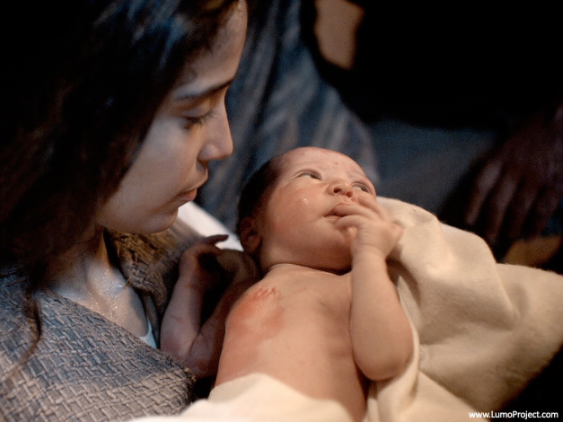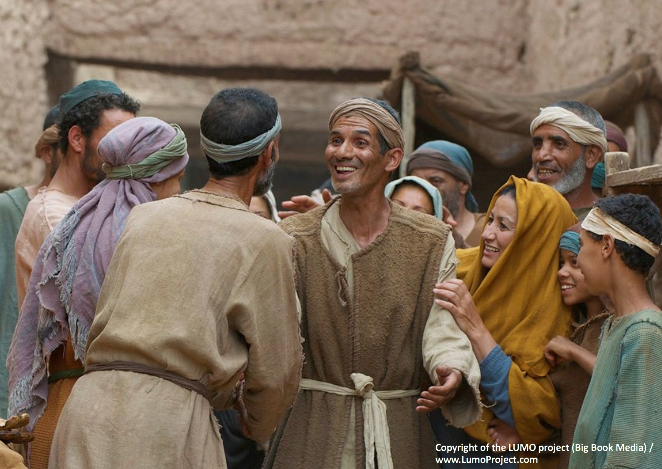“For God so loved the world that He gave His only begotten Son, that whoever believes in Him should not perish but have everlasting life.” John 3:16
You can experience the joy and peace of Christmas every day by hearing and believing the gospel of Jesus Christ. Jesus talks about two Christmas seasons in one of the most familiar verses of the Bible: “For God so loved the world that He gave His only begotten Son, that whoever believes in Him should not perish but have everlasting life.” (John 3:16).
This verse falls in the middle of a conversation between Jesus and a religious ruler named Nicodemus (John 3:1-21). Nicodemus thinks the way to heaven is by living a good life. But Jesus confronts him with the truth that he must be born again by believing in Christ alone for eternal life. It is not what you do that gets you to heaven, it is what Christ has already done for you on the cross, and simply believing in Him.
The first Christmas season is seen in the first part of the verse: “For God so loved the world that He gave His only begotten Son.” No one has ever loved to the degree that God has loved. He loved the world. He did not limit His love to one country, culture, or color. God loved everyone.
Because God loves everyone, His love cannot be earned. God loves us now, not when we get better. He loves us regardless of what we have done or not done. Do you realize that nothing you do can make God love you any less? God has designed us to be loved by Him. Only His love can meet our deepest needs. Sadly, we often look in the wrong places for God’s love, don’t we? We look for love in – a cell phone, a job, money, sports, alcohol, a computer, drugs, or a brief romantic relationship. God’s love isn’t found in these things. His love is found in the Person of Jesus Christ.
How did God express His love for us? “He gave His only begotten Son.” The phrase “only begotten Son” does not mean Jesus had a beginning like a baby that is birthed by his parents. The word translated “only begotten” (monogenḗs) literally means “one of a kind.” Jesus Christ is the only One of His kind because only He is fully God (John 1:1-3) and fully Man (John 1:14).
Over two thousand years ago, God’s Son, Jesus Christ, was born in a manger on the earth even though He pre-existed as God. He loved you and me so much He was willing to become a helpless baby. Here He was, the Creator of the universe, lying in the arms of a woman that He created! God sent Jesus so you could know what He is like (John 1:18). If God wanted to communicate to birds, He would have become a bird. If God had wanted to communicate to cows, He would have become a cow. But God wanted to relate to you and to me, so He became a human being without ceasing to be God.
You may be Catholic, Protestant, Jewish, Buddhist, Muslim, Mormon, or an atheist. It does not matter what your religious background is because Christ did not come to give us religion, He came to give us a relationship. Christmas is God saying, “I want to relate to you. I want you to know Me as much as I know you.”
Because all of us have sinned against God (Romans 3:23), we deserve to die forever in the lake of fire (Romans 6:23; Revelation 20:15). But Jesus came that first Christmas season to die in our place on a cross and rise from the dead (I Corinthians 15:3-6). Christ paid for the gift of eternal life.
When you receive a gift, do you have to pay for it? No, of course not. Why? Because it is already paid for. Eternal life is free to you and me (Romans 6:23b; Ephesians 2:8-9) because Jesus already paid for it when He died on the cross (John 19:30) and rose from the dead (I Corinthians 15:3-6). Jesus is alive today! So, the first Christmas season was when Christ came to us.
The second Christmas season is now when Christ invites us to come to Him. Jesus said, “Whoever believes in Him should not perish but have everlasting life.” (John 3:16b). Does the word “whoever” include everyone? Yes. It includes the best and worst of people and everyone in between.
Christ invites everyone to believe in Him for His free gift. He did not say “whoever behaves…” Jesus simply says, “whoever believes…” Receiving Christ’s gift of eternal life is apart from any good works we might do.
Jesus is not asking you, “Do you do good in the community?” because He never said, “Whoever does good in the community should not perish but have everlasting.” Nor is Jesus asking you, “Did you live an obedient life?” because He never said, “Whoever lives an obedient life should not perish but have everlasting.” Nor is Jesus asking, “Do you have religion?” because He never said, “whoever has religion should not perish but have everlasting.”
Jesus is asking you, “Do you believe in Me?” because He said, “whoever believes in Him should not perish but have everlasting life.” What does it mean to believe? To believe simply means to trust or depend upon. It is so simple a child can do it, yet, as adults, we have made it difficult. Jesus says you “believe” and “have.” You have what you take, correct?
What do you like the most about Christmas? Most people will say, receiving gifts, right?! To enjoy a gift, what must you do? You must receive it.
Jesus Christ was born in a manger and died on a cross so we could receive eternal life as a free gift. We cannot trust our obedience to God’s commands, our good life, our religion, or our prayers to receive eternal life. Instead, we must believe or trust in Christ alone to receive His gift of eternal life and live with Him forever in heaven. The moment you trust Christ, Christmas will never end for you. What makes Christmas lasting is knowing you will live forever in God’s presence. Jesus asks us to take the eternal life that He is freely offering to us.
Christ promises that when you believe in Him you “should not perish” in hell. When you believe in Christ, He promises you will be rescued from eternal punishment. When Jesus speaks of perishing, He is not talking about physical death, He is talking about suffering forever and ever in the lake of fire (Revelation 20:10; 20:15). Many people don’t believe in hell today, but they better be sure about it because no one can afford to be wrong on this issue. Everyone needs to be rescued because “all have sinned…” (Romans 3:23).
The word “but” contrasts eternal death and torment (“perish”) with “eternal life” and enjoyment. Jesus is acknowledging that there is a place of eternal ruin where people will be in agony forever. “But,” He says, “You can have the opposite of death, agony and torment – you can have eternal life.” All people exist forever, the question is where will you live when you die – heaven or hell?
When you believe in Jesus, He promises that you can be sure that you “have everlasting life.” Jesus did not say, “might have” or “hope to have.” He simply says, “have,” which expresses absolute certainty. You can be one hundred percent sure that you have eternal life because Jesus promises it to all who believe in Him. If you could lose your salvation, then Jesus just lied to us in John 3:16. Our salvation is based upon a promise that cannot be broken. It comes from a God who cannot lie.
Eternal life is described in John 17:3 as knowing God the Father and God the Son personally forever. Eternal life begins when you believe in Jesus, not when you die or after you die. What could possibly be greater than that? If you have not believed or trusted in Jesus Christ alone to give you His gift of eternal life, why not do so right now? This is how you can tell God in prayer what you are doing:
“Dear God, I come to you now as a sinner. Nothing I am or do makes me deserving of heaven. I now understand that Jesus Christ, the One born in a manger, died for me on a cross and rose again. I place my trust in Christ alone for His gift of eternal life. Thank You for the gift of eternal life I have just received. In Jesus’ name. Amen.”
When you believed in Jesus for His gift of everlasting life, He came to live inside you through His Holy Spirit (John 7:37-39). You can get to know Jesus better by talking to Him in prayer (Philippians 4:6-7) and by listening to Him as you learn to read and apply the Bible to your life (2 Timothy 3:16-17). Find a church where you can worship God with other like-minded Christians (Hebrews 10:24-25). Tell others about Jesus and what He can do for them (Matthew 4:19).
To learn more about how you can experience the joy and peace of Christmas every day of your life, please go to our website at www.seeyouinheaven.life and download our free digital Pressing On discipleship materials to go through with those you care about.



